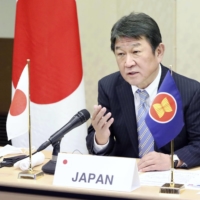The foreign ministers of Japan and the Association of Southeast Asian Nations on Tuesday agreed on the importance of freedom of navigation in the South China Sea, where China has conflicting territorial claims with some of the 10-member bloc.
In an online meeting with his ASEAN counterparts, Toshimitsu Motegi stressed Japan’s opposition to any attempts to unilaterally change the status quo of the Indo-Pacific by force, but did not single out China, according to the Japanese Foreign Ministry.
“As we face the challenge posed by the coronavirus pandemic, it is important for us to maintain and strengthen principles of the rule of law and transparency in the Indo-Pacific region,” Motegi said at the beginning of the talks.
Motegi also reiterated Japan’s support for ASEAN’s bid to implement its five-point consensus on how to tackle the political crisis in Myanmar following a Feb. 1 coup by the military, including the immediate cessation of violence and constructive dialogue among all parties concerned, the ministry said.
The Japanese minister invited the leaders of the ASEAN countries to Japan for a summit in 2023 to commemorate the 50th anniversary of building friendship and cooperative relationships between Tokyo and the regional bloc.
The ministers also discussed cooperation in responding to the coronavirus pandemic, with Japan pledging to provide more vaccine doses and support for the health care system in the ASEAN countries. Tokyo has so far offered 9.6 million vaccine doses to the regional body, according to the ministry.
Japan and ASEAN ministers also agreed on the importance of stripping North Korea of its nuclear and missile development programs.
ASEAN groups Brunei, Cambodia, Indonesia, Laos, Malaysia, Myanmar, the Philippines, Singapore, Thailand and Vietnam.
Four of the 10 members — Brunei, Malaysia, the Philippines and Vietnam — as well as Taiwan have overlapping territorial claims with China in the South China Sea, through which much of Japan’s oil imports pass.
In a time of both misinformation and too much information, quality journalism is more crucial than ever.
By subscribing, you can help us get the story right.
SUBSCRIBE NOW
KEYWORDS
Toshimitsu Motegi, ASEAN



